
Review of Pacific Basin Financial Markets and Policies
Scope & Guideline
Fostering Innovation in Financial Policies and Markets
Introduction
Aims and Scopes
- Financial Market Analysis:
The journal focuses on empirical and theoretical studies analyzing the structure, behavior, and performance of financial markets, particularly in the context of the Pacific Basin. - Corporate Governance and Social Responsibility:
There is a consistent emphasis on research exploring the intersection of corporate governance, corporate social responsibility (CSR), and firm performance, highlighting how these elements impact market outcomes. - Policy Implications and Economic Impact:
The journal aims to discuss the implications of various financial policies and economic conditions, providing insights into their effects on regional and global markets. - Sustainability and Ethical Finance:
A growing area of focus includes the role of sustainability in finance, addressing how ethical considerations and sustainable practices influence financial decisions and market dynamics. - Behavioral Finance and Investor Sentiment:
Research pertaining to behavioral finance, particularly how investor behavior and sentiment influence market trends and asset pricing, is a significant area of interest.
Trending and Emerging
- Impact of Technology on Finance:
There is a marked increase in studies examining the influence of technology, including fintech and digital currencies, on financial markets and investment strategies. - Sustainable Finance Practices:
Research focusing on sustainable finance, including ESG (Environmental, Social, and Governance) considerations and their impact on investment decisions, has gained significant attention. - Corporate Social Responsibility and Financial Performance:
An emerging trend is the exploration of the relationship between CSR initiatives and their quantifiable effects on corporate financial performance, reflecting a growing interest in ethical finance. - Behavioral Insights into Market Dynamics:
Recent papers are increasingly delving into behavioral finance, analyzing how psychological factors affect investor behavior and market outcomes, signaling a shift towards understanding market anomalies. - Global Economic Interdependencies:
Research that investigates the interconnectedness of global markets, particularly in light of recent geopolitical events and economic shifts, is becoming more prominent, reflecting a need for comprehensive analyses of market impacts.
Declining or Waning
- Traditional Banking Sector Studies:
Research centered on traditional banking practices and their performance metrics has seen decreased publication frequency, possibly indicating a shift towards fintech and alternative financial services. - Fixed Income Market Analysis:
The analysis of fixed income securities, including bonds and their market dynamics, appears to be waning, as the focus shifts towards more contemporary financial instruments and markets. - Macroeconomic Forecasting Models:
There is a noticeable reduction in studies employing traditional macroeconomic forecasting models, suggesting a potential move towards more innovative or data-driven approaches in financial analysis. - Static Capital Structure Theories:
Research that strictly adheres to traditional static capital structure theories is becoming less prevalent, as dynamic models and real-time analysis gain traction in the literature. - Regional Trade Studies:
While still relevant, the frequency of studies focused solely on regional trade dynamics has declined, possibly overshadowed by broader global economic analyses.
Similar Journals

Pacific-Basin Finance Journal
Advancing Knowledge in Pacific Finance and EconomicsPacific-Basin Finance Journal is a prestigious academic journal that focuses on critical developments and innovative research within the fields of finance and economics, specifically tailored to the Pacific region's unique economic landscape. Published by Elsevier, the journal boasts an impressive impact factor and is categorized in the Q1 quartile for both Economics and Econometrics and Finance as of 2023. This indicates its high relevance and position among the top journals in its field, with Scopus rankings reflecting a strong standing in the competitive landscape of finance research, holding the 45th position out of 317 in Finance and the 108th in Econometrics. Established in 1993, the journal is committed to disseminating rigorous theoretical and empirical research findings that enhance the understanding of financial systems in the Pacific Basin. Although the journal is not open access, it provides invaluable insights and comprehensive studies aimed at professionals, researchers, and students alike, fostering a deeper comprehension of the region's economic dynamics and global interconnectedness.
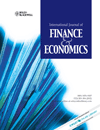
INTERNATIONAL JOURNAL OF FINANCE & ECONOMICS
Innovative Perspectives on Finance & EconomicsInternational Journal of Finance & Economics, published by Wiley, is a premier academic journal that serves as a vital resource for researchers and professionals in the fields of finance, accounting, and economics. With an impressive impact factor and a reputation for excellence, the journal is recognized in the 2023 Scopus rankings, placing in the top quartiles across multiple categories, including Q2 in Accounting, Economics, and Finance. The journal has been a significant contributor to academic discourse since its inception in 1996, with its converged years extending to 2024, thereby ensuring the continuous advancement of knowledge in these critical areas. Although it operates under a traditional subscription model, its comprehensive articles provide insightful analyses, empirical research, and theoretical advancements that cater to a diverse audience—from seasoned scholars to emerging students in the field.
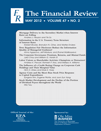
FINANCIAL REVIEW
Elevating Research Standards in Finance and EconomicsFINANCIAL REVIEW, a premier journal in the fields of Economics and Finance, is published by Wiley and has been contributing to the body of knowledge since its inception in 1969. With an impressive track record reflected by its Q1 ratings in both Economics and Econometrics as well as Finance, this journal stands out as a crucial resource for researchers, professionals, and students alike. The journal hosts a diverse array of scholarly articles that not only address contemporary financial issues but also provide innovative insights into economic theories and practices. Although it does not offer open access, its high impact factor and strong Scopus rankings—ranking #275 out of 716 in Economics and Econometrics and #125 out of 317 in Finance—underscore its significance in advancing academic discourse and influencing policy in the financial sector. Researchers are encouraged to explore the latest findings and methodologies shared in this esteemed journal, ensuring they remain at the forefront of their fields.
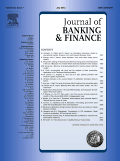
JOURNAL OF BANKING & FINANCE
Transforming Banking Practices Through Rigorous AnalysisWelcome to the Journal of Banking & Finance, a premier publication in the fields of finance and economics, expertly published by Elsevier. With its esteemed Q1 ranking in both the Economics and Econometrics and Finance categories for 2023, this journal frequently garners significant attention from researchers, professionals, and academics alike. Established in 1977, it has become a crucial resource for the latest research and advancements in banking and financial services, influencing policies and practices on a global scale. The journal's commitment to high-quality, peer-reviewed content ensures that it not only contributes to academic discourse but also drives real-world financial innovation. As part of the respected Elsevier publishing collection, the journal's rigorous standards and comprehensive analysis serve as indispensable tools for those seeking to understand and navigate the complexities of the financial landscape. Located in the Netherlands, the Journal of Banking & Finance continues to play a vital role in shaping the future of financial research through its impactful insights and research contributions.
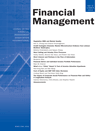
FINANCIAL MANAGEMENT
Shaping the Future of Financial Management ResearchFINANCIAL MANAGEMENT is a premier academic journal published by Wiley, focusing on the intricate domains of Accounting, Economics, and Finance. With an ISSN of 0046-3892 and an E-ISSN of 1755-053X, this esteemed journal has made significant contributions to the global discourse on financial practices and theories since its establishment in 1996. Situated within the top tier (Q1) in its respective fields, FINANCIAL MANAGEMENT ranks impressively in Scopus, positioned at 30 out of 176 in Accounting and 57 out of 317 in Finance, reflecting its high impact and relevance in the scholarly community. The journal is known for its rigorous peer-review process and publishes cutting-edge research aimed at advancing knowledge and practice in financial management. Although it does not offer Open Access, it remains accessible through institutional subscriptions, ensuring that researchers, professionals, and students remain at the forefront of developments in financial management. With a commitment to excellence, FINANCIAL MANAGEMENT continues to be an indispensable resource for those seeking to deepen their understanding of this critical field.

Abacus-A Journal of Accounting Finance and Business Studies
Advancing Knowledge in Accounting and FinanceAbacus: A Journal of Accounting Finance and Business Studies, published by WILEY, stands as a prominent platform dedicated to advancing the fields of accounting, finance, and business studies. With a history dating back to 1965, this journal has consistently delivered high-quality research and insights, culminating in its current status as a Q2 journal in Accounting according to the 2023 category quartiles. Operating from the United Kingdom, Abacus provides essential scholarly content for researchers, practitioners, and students alike, aiming to bridge the gap between theory and practice in its diverse sub-disciplines. Although it does not currently offer open access, its reputation is underscored by a solid Scopus ranking of #83/176 in the field of Accounting, representing the 53rd percentile for quality and impact. With its continued focus on innovative research, Abacus remains a crucial resource for anyone looking to navigate the evolving landscape of accounting and finance.
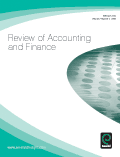
Review of Accounting and Finance
Exploring the Frontiers of Financial InsightReview of Accounting and Finance, published by EMERALD GROUP PUBLISHING LTD, is a prestigious academic journal with a longstanding commitment to advancing scholarship in the fields of accounting, finance, and economics. With an ISSN of 1475-7702 and E-ISSN of 1758-7700, this journal has established itself as a key resource for researchers, professionals, and students seeking robust empirical and theoretical insights. It enjoys a strong reputation, reflected in its 2023 Scopus rankings, where it is positioned in the top quartile for Economics and Finance, and holds a Q2 category in Accounting. The journal covers a wide range of topics, aiming to foster discussion and disseminate knowledge that bridges the gap between theory and practice. Although it does not offer open access, its comprehensive scope is invaluable for those dedicated to understanding the complexities of financial systems and accounting practices from a global perspective. Published continuously from 2002 to 2024, the Review of Accounting and Finance is an essential outlet for innovative research that drives the discipline forward.
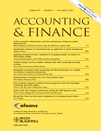
Accounting and Finance
Innovating the intersection of finance, economics, and accounting.Accounting and Finance is a premier journal published by WILEY that serves as a significant platform for interdisciplinary research in the dynamic fields of accounting, finance, and economics. With a commitment to advancing knowledge and practice, this journal has maintained a strong presence since its inception in 1979 and continues to attract high-quality contributions that address contemporary challenges and trends. It holds an impressive impact factor, reflecting its rigorous peer-review process and the high citation rates of its publications. Categorized in the second and first quartiles across multiple fields, including accounting and economic finance, it ranks highly among its peers, notably achieving a rank of #39 out of 176 in Accounting and #40 out of 242 in Economics, Econometrics, and Finance (miscellaneous). While it does not offer Open Access options, the journal remains accessible through academic institutions and libraries, promoting the dissemination of knowledge to researchers, industry professionals, and students alike. Recognized for its scholarly contributions and practical implications, Accounting and Finance continues to shape the discourse in its respective fields, making it an essential resource for anyone seeking to deepen their understanding of financial systems and regulatory frameworks.

Annual Review of Financial Economics
Exploring the Dynamics of Economics and FinanceAnnual Review of Financial Economics, published by Annual Reviews, stands as a pivotal journal in the fields of Economics and Finance, recognized for its rigorous analysis and comprehensive reviews since its inception in 2010. With an impressive impact factor reflected in its Q1 ranking in both Economics and Econometrics and Finance for 2023, this journal serves as an essential resource for researchers, professionals, and students keen on understanding the dynamic interplay of financial theories and practices. The ISSN 1941-1367 and E-ISSN 1941-1375 signal its commitment to accessibility and dissemination of cutting-edge research within the community. Addressing crucial topics from market behavior to economic modeling, each annual volume synthesizes the latest findings and theoretical advancements, thus contributing significantly to the global discourse within financial economics. With its high Scopus rankings, including a finance rank of #75 out of 317, the journal continues to foster a deep understanding of financial systems and their implications, serving as an invaluable tool for anyone engaged in the broader economic landscape.
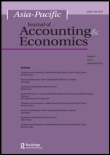
Asia-Pacific Journal of Accounting & Economics
Empowering researchers with cutting-edge insights and methodologies.Asia-Pacific Journal of Accounting & Economics, published by Routledge Journals, Taylor & Francis Ltd, is a prestigious platform dedicated to advancing scholarly research in the fields of accounting, economics, and finance. Established in 2000 and converging its academic rigor through 2024, this journal serves as an essential resource for researchers, professionals, and students seeking to explore the interconnections and complexities within these disciplines. With a notable impact reflected in its Q3 rankings in Accounting, Economics, and Finance, the journal showcases the latest empirical research and theoretical advancements. Although it operates under a traditional access model, its commitment to quality and relevance in the Asia-Pacific region continues to make it a vital publication for those aiming to contribute to the understanding of economic dynamics and financial practices. Researchers and professionals are encouraged to engage with the articles herein to stay abreast of new insights and methodologies shaping the landscape of accounting and economics.